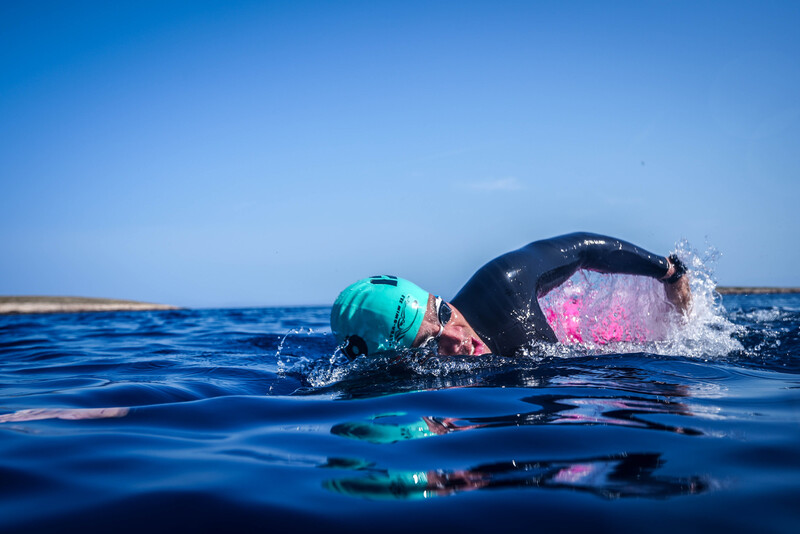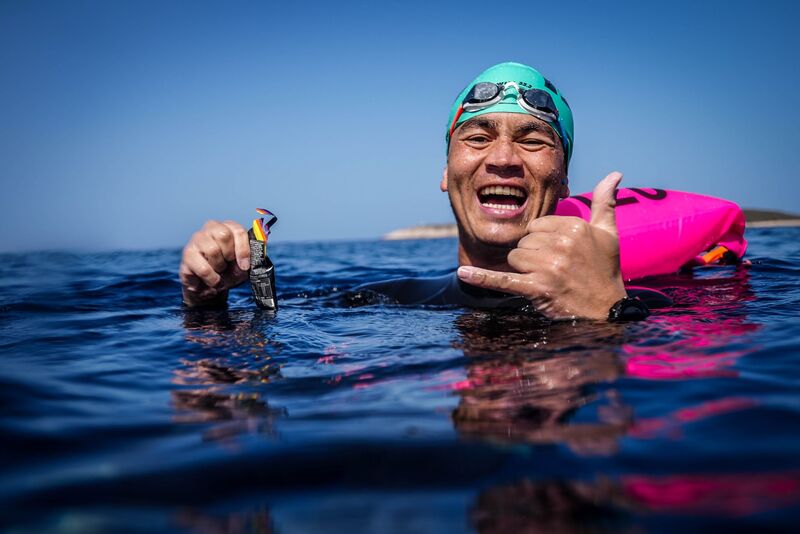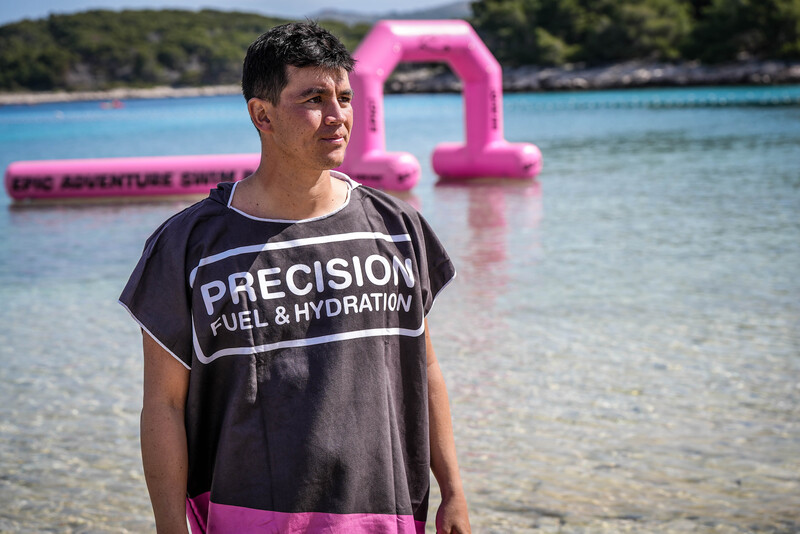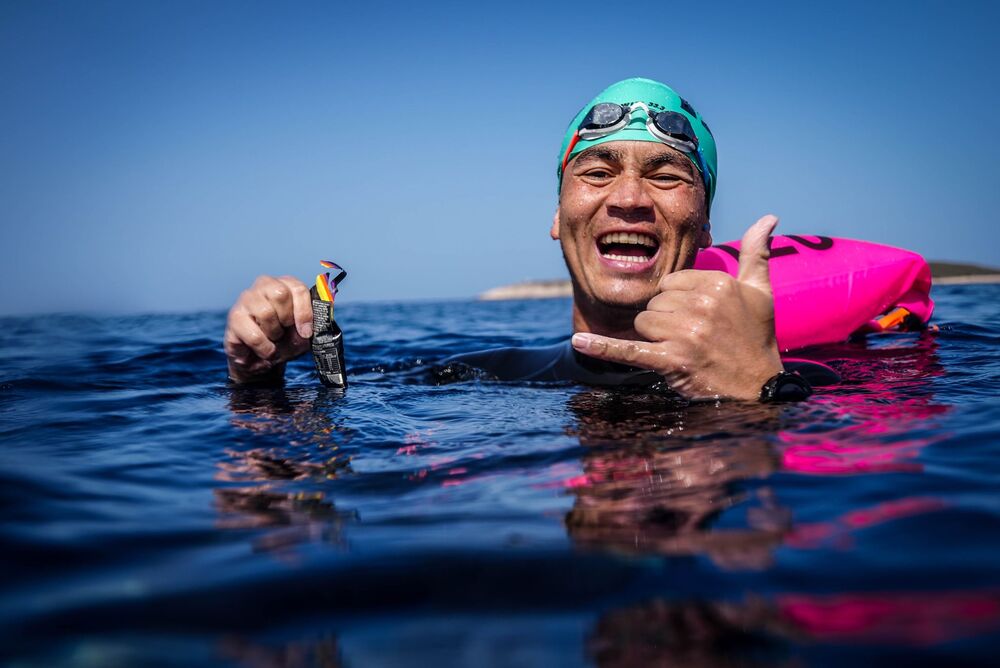In part one of our interview with Andy Donaldson, the Australia-based Scottish marathon swimmer explained how he rediscovered his love for the sport.
Here he relives swimming seven of the toughest channel crossings in the world to set a new world record for The Oceans 7 Challenge, taking us inside one of the most impressive endurance feats of modern times...
The English Channel
Date: 7 August 2022 Location: England to France Distance: 33 kilometres (18 nmi) World record: 6 hours 55 minutes Previous British record: 8 hours 5 minutes Donaldson's swim time: 8 hours (new British record)
The “Everest” of open water swimming was first up. A young Andy Donaldson has dreamt of it as a kid growing up in West Kilbride in south-west Scotland, but never thought it would come to pass. It came quicker than expected.
“I got notice about a cancelled spot in April, so there was little time for preparation, and I didn’t have much experience swimming in cold water, so I was a bit nervous about that too,” he says.
His recollections of seeing the white cliffs of Dover, with swimmers from all corners of the globe, from India, Brazil, Turkey and Australia, preparing for their own Channel swims, is one of his most vivid memories, but he also recalls the unsettled feeling.
“They call it the Dover coaster. The name given to the days leading up to your swim. For most competitions, you know the day, the distance and the start time, almost down to the second. All of that goes out of the window with these channel swims.”
Instead, swimmers are given a window of a few days as they pray for optimal weather conditions. A phone call could come in giving four hours. It’s a case of managing your body and emotions. Then once it starts, there’s the wind, the swells, the changing direction and strength of the current.
“Everything can change when you’re out there,” Donaldson adds. “It might be 20 miles as the crow flies but you could swim far further. This was the first time I’d been exposed to this lack of control, but I just had to get on with it.”
When the swim started in the early hours, Donaldson recalls the sea being like glass, as the sun came up there wasn’t a cloud in the sky. The world record looked like it could be on.
“I was in the shape of my life coming in. I was holding my 72 seconds per 100 metres pace through the first 10 kilometres and remember getting updates and thinking that if we do this for a couple more hours, we’ll be across in six-and-a-half-hours. This is magic.”
Over the next two hours the progress stalled. But Donaldson hadn’t slackened. The stroke rate was the same. It was the first time he truly understood tidal power and how much he was at its mercy.
“They were strong and not in our favour, and as we kept pressing on towards France they reached their peak. I had one update from my coach on the white board they hold over the side of the boat that stuck with me. ‘Can you go any faster? If not, you're going to miss France.’ I remember thinking: ‘That’s not good!’”
Donaldson had drained the tank believing he’d be closer to the finish. It was still a new British record and the fastest time in the past 10 years. “I think it was the best outcome,” he reflects. “I came into it a bit green and not truly understanding what is involved in ultra marathon swimming.
“I was feeling the pressure to get off to a good start, but it was more valuable to learn along the way. My mind shifted after this first swim and I recognised how much is outside of our control.”

The North Channel
Location: Ireland to Scotland Date: 19 September 2022 Distance: 34.5 kilometres (18.6 nmi) World record: 9 hours 9 minutes 30 seconds. British record: 9 hours 31 minutes 35 seconds Donaldson’s swim time: 9 hours 13 minutes 57 seconds (new British record)
Each channel swim had its own specific set of challenges. For the North Channel it was twofold: the extreme cold and lion’s mane jellyfish. “I was very nervous about both,” Donaldson says. “The jellyfish are venomous, can be up to eight metres in length and you can become wrapped in their tentacles.”
But on the day, and just a third of the way into the crossing, it was the temperature that proved more concerning. “I remember thinking: ‘I’m so cold right now, my arms are so heavy.’ In fact, that was all I could think about. I didn’t know how I could continue for another five minutes, let alone five hours.
“I was trying to use all these tools I’d developed such as positive self talk, visualisation and slow breathing, but the negative thoughts were creeping in and it felt like the dam was about to burst.
“I looked up at the team on the boat, thinking I’d better let them know what’s going on. Between breaths I shouted how cold I was feeling and Jay, my handler, wrote something on the whiteboard like: ‘We hear you, warmer feeds are coming, we’re with you all the way.’
“The psychology behind it is amazing. They hadn’t even given me the hotter feeds yet, but already I felt as if a weight had been lifted from my shoulders and I remembered that I am not tackling this channel swim on my own.”
The frequency of the feed was upped from three to four per hour and the pace picked up once more. Donaldson finished just four minutes shy of the world record.
“We gave it a good nudge and to go from being in dire straits and almost giving up to almost breaking the record was some turnaround and a lesson of the importance of teamwork.”
Cook Strait
Location: South Island to North Island, New Zealand Date: 7 March 2023 Distance: 22.5 kilometres (12.1 nmi) Previous world record: 4 hours 37 minutes Previous British record: 7 hours 0 minutes 47 seconds Donaldson's swim time: 4 hours 33 minutes 50 seconds (new world record)
The popular mantra of the five Ps – Proper Preparation Prevents Poor Performance – goes out of the window here. It was the worst preparation of any of the seven swims… and resulted in a world record.
Donaldson arrived in New Zealand in February to a flurry of weather warnings. The inter-island ferry in the Cook Strait had issued a Mayday after it lost power and was almost swept into the North Island. Cyclone Gabrielle hit the North Island and there were a number of earthquakes.
“I was in Wellington, waiting for an opportunity to start,” Donaldson remembers. He was there for three weeks, occasionally receiving a message from the skipper that they might go within 48 hours. The ‘might’ wouldn’t materialise. “It was a mental rollercoaster, waiting on something I had no control over again.”
There are neap tides and spring tides. In simple terms the neap tide is a weaker tide, moving a lower volume of water. The spring tide is more powerful. Each happens twice a month and Cook Strait swims have historically happened on the kinder neap tide.
“I took a call from the organiser, who said she had a slot for me but I might not like it. It was swimming through the night on a spring tide. No-one had done it before in the Cook Strait.”
If Donaldson was unsure, the locals were certain. It wouldn’t be possible. Horror stories poured forth of those who had tried and been left effectively treading water for five hours.
“Exactly what you need to hear before the swim! I was very nervous again,” Donaldson says. “But it was a great lesson on acknowledging what other people think but not letting it determine my performance.”
They researched, hatched a navigational plan and were ahead of world record pace after two hours. The English Channel swim had been a cautionary lesson in not getting ahead of themselves, but after four hours the end was almost in sight.
“I began to think: ‘Let’s bring this home’, and as soon as I did the tide started changing. The guys on the boat were waving their arms and I knew that could only mean one thing: Hurry up!”
As is typical for channel swims, the boat stays about 100 metres from the shoreline, and to complete the crossing swimmers have to emerge out of the water and, in this case, touch the cliff face. From there they swim back to the boat, in Donaldson’s case to find out whether he’d broken the record.
“That part seemed to take forever. The result hanging in the balance, but the guys were over the moon. It was a surreal experience.” The champagne was on ice for the following day, not on the boat. “I didn’t want to jinx it.”

Moloka’i Channel (Kaiwi Channel)
Location: Moloka’i to O’ahu, Hawaii Date: 18 April 2023 Distance: 42 kilometres (23 nmi) World record: 12 hours 2 minutes British record: 14 hours 9 minutes Donaldson's swim time: 15 hours 51 minutes
“I was coming off two British records and a world record, thinking let’s have another crack at a world record. It was 12 hours, but I told the skipper that if things went well we could go under 10 hours.”
It was the longest and by common consent hardest of all seven swims, but Donaldson was in confident mood for the 42-kilometre crossing between the Hawaiian islands of Moloka’i and Oahu.
The team set off at 7pm to swim into the night and ran into problems from the start. Conditions were far worse than expected, the swells huge, and the notoriously unpredictable current was pushing him back. The five kilometre per hour target pace was almost halved, punctuated by bouts of vomiting amid constant nausea. “I was getting thrown around like a rag doll in a washing machine,” Donaldson says. “It was nasty.” It worsened.
The next update from the boat was that they were barely making headway at all. “I remember this being a hammer blow,” he recounts. “Nothing can prepare you for that. You can train to swim at night and be comfortable in the dark, but you don’t know how you’ll react to that psychological blow until you experience it. It was brutally confronting. I start thinking: ‘Can this be done?’ I’ve been throwing up for seven hours and still have a mountain to climb.
“I needed a good enough reason to keep pushing forward: everyone supporting me; the messages Jay was relaying from people around the world; the awareness we were trying to create of mental health and the money we were raising for the Black Dog Institute, and the little boy who dreamed of racing at the Olympics and wanted to do his family proud. That was the jet fuel that kept me going.”
The integral role of the support crew was thrown into the spotlight once more. The motivation, the gallows humour, the reassurance about swimming in a channel that is several kilometres deep where you can’t don't know what is underneath. And still more reassurance when the swim was paused due to sharks.
“I had to fight every urge not to panic,” Donaldson says. “If I did, maybe this thing thinks that I’m prey. My response was to swim towards the kayak where the shark shields are, cables that are trawled through the water and omit a certain frequency that drives away sharks.”
It’s not an easy task. Because of the size of the swells, the boat is forced to move further ahead so it doesn’t endanger the swimmer. They regroup every 15 minutes for a feed, but otherwise it is only the kayak for company. “A couple of pin drops in the middle of the Pacific Ocean.”
The goal to break the record turned to one of completion. Another unforecast storm hit, the winds picked up 30 knots, and Donaldson was pushed almost four kilometres north, a circuitous route, especially at the pace he was moving. The total distance ended up being closer to 55 kilometres and the swim took more than 16 hours – six hours longer in the water than he’d ever been.
“It wasn’t pretty or record setting, but it was the most valuable experience of my life, and in the face of adversity we’d overcome this challenge, together as a team, and found our way through a situation where many would have given up.”
Strait of Gibraltar
Location: Spain to Morocco Date: 20 May 2023 Distance: 14.4 kilometres (7.8 nmi) World record: 2 hours 16 minutes British record: 3 hours 16 minutes __Donaldson's swim time: 2 hours 56 minutes (new British record) __
The shortest of the seven swims, and thankfully, a little easier than Moloka’i. It wasn’t entirely without drama though. As Donaldson flew into the Iberian peninsula, news was breaking of killer whales ramming boats in the strait. “It was a little nerve wracking and not what you need to hear.”
Undeterred, and despite conditions not being optimal for a fast swim, Donaldson duly ticked off number five in another British record.
“People expected me to break the overall record, but we didn't have the conditions to allow for it,” he says. “It was still another reminder that success isn’t all about results and fast times.”

Catalina Channel
Location: Santa Catalina Island to Los Angeles Date: 11 July 2023 Distance: 32.3 kilometres (17.4 nmi) World record: 7 hours 15 minutes British record: 9 hours 33 minutes Donaldson's swim time: 9 hours 22 minutes 52 seconds (new British record)
Compared to the frigid North Channel, Santa Catalina to Southern California sounds more like a sun-kissed splash on vacation. But
it underlines the nature of open water endurance, and especially an Oceans Seven attempt in a crowded time frame, that the swim itself is not the only barrier to success.
“We had some cross currents that hampered progress and I wasn’t swimming as fast as I’d have liked, but the bigger problem was that I’d been sick heading into the swim, and it was compounded by financial worries,” Donaldson says.
“The whole challenge had been self-funded and I was struggling.
I had about $700 in my bank account and was trying to secure more sponsors. It was a stressful time.”
Arriving in Los Angeles, Donaldson crashed. “My body was smashed. I slept for 18 hours on one day in the lead-up and it was the first channel swim where I didn’t want to be there. I wasn’t in the right headspace.”
The vagaries of logistics now played to his favour. The crayfishing boat that is used as the support vessel was much bigger than the boats used in earlier swims and it meant more supporters could board. Sixteen in total, including 10 family members who had flown in from Scotland.
“You could look at it two ways, I guess,” Donaldson adds. “An extra source of pressure or one of motivation. I remember some words from my dad. I told him I was nervous, not well and exhausted before it even started and he said something like: ‘You might not be feeling your best, but you can always give it your best.’ That’s the mantra I used for this one. Mentally I was knackered, and it took everything to keep going, but I was proud of this one.”
The currents weren’t helpful, but not Moloka’i level, and there was a wonderment to the ocean that day.
“There was no wind and the surface of the water was like a mirror,” he recalls. “I flicked onto my back and there were stars everywhere. There was bioluminescence to the water and the glowing algae made it feel as if I was swimming through the Milky Way. Plus, we had dolphins accompanying us. It was an unforgettable experience and one I could share with my family and support crew on the boat. Money might have been tight but you couldn’t put a price on it.”
Tsugaru Strait
Location: Japanese islands of Honshu and Hokkaido Date: 27 July 2023 Distance: 19.5 kilometres (10.5 nmi) World record: 6 hours 11 minutes British record: 11 hours 14 minutes Donaldson's swim time: 13 hours 4 minute 30 seconds
This time there was sporting politics involved. As the final swim, there seemed to be more riding on it and the physical and mental fatigue had built up. Donaldson also had the knowledge that of the 13 swimmers who had attempted the Tsugaru Strait so far that year, all 13 had failed.
Some aborted the swim, others didn’t even get to start and it was rumoured that many hadn’t been refunded. Having reached a nadir, the sport’s global body had even launched an investigation into the conduct of the skippers
With this backdrop, Donaldson decided to organise his own passage. He contacted a skipper who was eight years into retirement, and who felt a different approach was needed. Rather than the traditional route, rendered near impossible by the cross-currents, they would attempt a longer S-bend. There was a lot of online debate online as to its merits.
“The easiest way to describe it is a lot of politics and online chatter,” Donaldson explains. “I had to drown it out and keep my eyes on what was within our control.”
The conditions were again poor, Donaldson was again vomiting with minutes of starting and progress was slow going. There were two hard deadlines to meet. The first was to complete the swim within 14 hours to break the overall record of 64 hours. The second was to finish by 7pm or be dragged from the water by the Japanese coast guard who prohibits night swimming.
“I was getting tossed about and the current was pushing us downstream, which was always in the plan, but we couldn’t break out of it at the other end,” he explains “I was getting a message that we’d have to pick it up otherwise we’d get pulled, and it was a tough slog.”
Donaldson finished just after 6pm in 13 hours, the final touch on a sea wall built to halt coastal erosion. Targets met and with it the first person to swim the Tsugaru Strait that year.
“Had I not experienced the adversity of Moloka’i, I wouldn’t have been equipped,” Donaldson says. “It was an overwhelming sense of relief that we’d done it, but took a while to sink in as we were just so exhausted.”

Andy Donaldson’s record-breaking feats
As well as setting five British records and one world record, Donaldson also set new standards for the Oceans Seven swim.
Former cumulative time world record: 64 hours 35 minutes New Cumulative time: 63 hours 2 minutes 9 seconds
Fastest time to complete all seven swims
Previous record: 2 years 60 days New record: 355 days
Source: longswims.com
